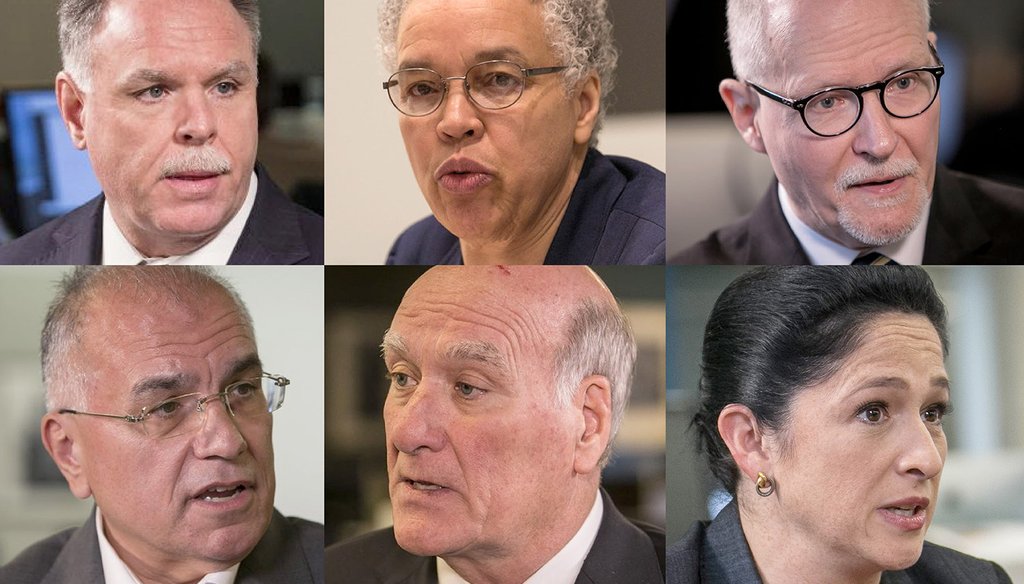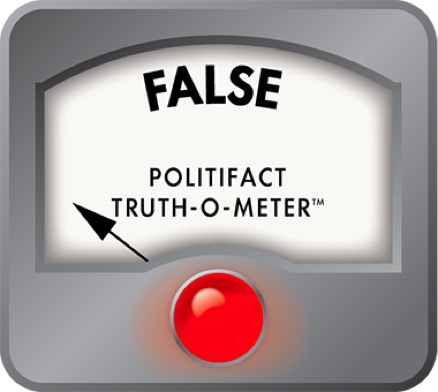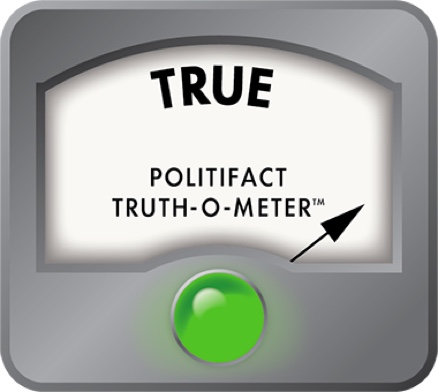Stand up for the facts!
Our only agenda is to publish the truth so you can be an informed participant in democracy.
We need your help.
I would like to contribute

Six of the candidates in Chicago's crowded mayoral race. Clockwise from top left: Garry McCarthy, Toni Preckwinkle, Paul Vallas, Susana Mendoza, Bill Daley and Gery Chico. (Sun-Times)
The race for Chicago’s next mayor features many contenders with government experience, so we weren’t surprised to encounter lots of boasts and jabs about performance in office while fact-checking the 14-candidate field in the lead-up to Tuesday’s initial round of voting.
With an April 2 runoff for the top two vote-getters all but a certainty, we decided to revisit some of the questionable things candidates have been saying about each other’s records in a struggle to differentiate themselves from the pack.
Garry McCarthy, the former Chicago police superintendent fired in the wake of the police shooting death of Laquan McDonald, recently released an ad claiming Chicago saw its lowest murder rates in a generation under his leadership. In two of the four-plus years McCarthy led the department, murder rates fell to a low not seen since the mid-1960s. But those years were bookended by ones in which murders spiked, so we rated the claim Mostly False.
Cook County Board President Toni Preckwinkle made a campaign issue out of McDonald’s 2014 shooting in an ad that credits her with bringing to light key information about the circumstances of his death. The commercial says Preckwinkle made sure the public learned about the medical examiner’s autopsy of McDonald, which showed the teen had been shot 16 times by an officer later convicted of murder. The reporter who broke the autopsy story has confirmed Preckwinkle’s role.
In the same ad, however, Preckwinkle also suggested she had been an early voice for demanding the release of police dashcam footage of the shooting that Mayor Rahm Emanuel’s administration kept under wraps for more than a year. We could find no evidence of that, leading to a Half True rating for her claim.
Two other candidates — Paul Vallas and Gery Chico — have sought to play off their experience guiding public education in Chicago.
Vallas and Chico ran the Chicago Public Schools together for several years under former Mayor Richard Daley, Vallas as CEO of the district and Chico as chairman of the school board.
In the campaign, Vallas has cast himself as a turnaround specialist who fixed dire financial problems at CPS. We rated one of those frequent Vallas claims on the subject Mostly True, but added a caveat. While Vallas — and Chico, too — improved CPS finances, they had the advantage of new state laws that removed fiscal handcuffs that had made the task harder for their predecessors.
Chico has also run ads touting spending and property tax cuts at the City Colleges of Chicago during a brief stint in 2010 when he chaired the board of trustees. Not said was that the savings from those cuts were so modest that it’s doubtful the average taxpayer took note. That earned his claim a Half True from us.
The evolving death penalty position of mayoral hopeful Susana Mendoza, now the Illinois comptroller but once a member of the Illinois House, figured in two of our fact checks.
Mendoza, who had once strongly backed the state death penalty, not only supported its repeal in 2011 but also claimed during a candidate forum to have cast the deciding vote in the House. Records and news clips from those days, however, showed she indeed voted for repeal but that it was a different House lawmaker who changed positions and put the measure over the top. We rated her claim Mostly False.
Preckwinkle, meanwhile, aired an ad that misrepresented Mendoza’s change of heart in 2011. It used selective and deceptive video editing of the House floor speech Mendoza made just prior to that vote to make it falsely appear Mendoza was pushing to retain capital punishment rather than end it. For that, we handed Preckwinkle our only Pants on Fire! rating of the mayor’s race to date.
Mendoza was also the target of a slap from Chico who claimed in an ad that as a legislator she "voted to hit working families with a massive new soda tax." Mendoza supported a major capital bill that increased sales taxes on soft drinks and other common convenience store items to help fund infrastructure spending. But the law didn’t create a designated soda tax as Chico suggested, so we rated his claim Mostly False.
We also vetted an attack by Mendoza that attempted to link rival Bill Daley with former Republican Gov. Bruce Rauner. On her campaign website, Mendoza accused Daley of "writing the blueprint" for record Springfield gridlock that occured as Rauner fought Democrats over the budget and other legislative priorities.
The claim hinged on Daley’s role as the co-author of a transition report for Rauner following his election in 2014. That document contained little in the way of concrete policy recommendations and there is no evidence it guided actions Rauner later took that contributed to the standoff in Springfield. We rated Mendoza’s claim False.
Daley has largely refrained from lobbing jabs at rivals but has also stressed a less-than-straightforward promise in campaign ads that he would place a moratorium on property tax hikes. Not said in those ads is that only about one-quarter of a typical Chicago property tax bill goes to fund city government, so a moratorium would by no means eliminate rising tax bills.
What’s more, by far the biggest slice of property tax bills goes to fund CPS, which levies taxes separately from city government even while functionally under the control of the mayor. A spokesman for Daley acknowledged to us that his moratorium on city tax hikes would not extend to the far more expensive school taxes.
We rated Daley’s tax claim Half True.
Our Sources
See fact-checks






































